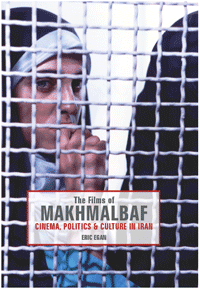
Pragmatic with patriarchy
Policing of the IWSF women's conference
September 23, 2005
iranian.com
At bottom, the intellectual, in my sense of the word, is neither a pacifier nor a consensus-builder, but someone whose whole being is staked on a critical sense, a sense of being unwilling to accept easy formulas, or ready-made clichés, or the smooth, ever-so-accommodating confirmations of what the powerful or conventional have to say, and what they do. Not just passively unwillingly, but actively willing to say so in public.
-- Edward Said
I am writing to you with regards to some of the comments that I have read over the summer regarding the IWSF conference in Vienna, and the so-called "rude" behaviour of some of its participants. I wanted to add my voice to this debate because the majority of responses have alluded to the younger generation of feminists, both inside and outside of Iran, who might be put off from attending this conference because of such behaviour.
I want to weigh in on this notion because I believe that this is quite a distorted representation of the younger generation of Iranian feminists, particularly those in the diaspora who are sick and tired of wishy-washy academics that do not address the reality of Iran's theocratic system of governance. In order to do this I want to make mention of another conference that I had attended last year.
On November 6 and 7, 2004, the Iranian Association at the University of Toronto organized a symposium entitled: Women's Artistic Creativity and Literature in Contemporary Iran. Iranian women directors, playwrights, entrepreneurs, and novelists from Iran were among the panelists and speakers. Three documentaries were also presented at the conference, and all three dealt with the lives of rural women in contemporary Iran.
The first documentary, "One Day with Sara, a Woman from Bezin", portrayed the daily life of Sara in Iran's Zanjan province. The documentary shows Sara operating a tractor, repairing and riding motorcycles, and creating jobs for the other villagers on her farm. At the end of the documentary, during the question and answer period, the director, Shahla Lahiji, declared, "twenty years ago we could not imagine that women like Sara existed."
Unfortunately, it seems that Lahiji just discovered Iran's villages and the fact that rural women have always enjoyed more freedom of mobility than urban women. Lahiji's remark is indicative of the de-contextualized and de- historicized representation of Iranian women at this conference. There was also no distinction made between rural and urban life: the Islamic state is not as present and pervasive in Iran's rural communities.
Of course, none of these issues were addressed in the film, and although we see Sara riding her motorcycle in the village, it is never mentioned that in any urban centre in Iran, Sara would be arrested or worse, for having done so. If people in the audience did not know that women like Sara exist in Iran, then that is a reality of the collective amnesia that a portion of the Iranian population is suffering from.
However, those of us who have never viewed Iranian women as being meek and malleable, and who have lived in or visited Iran's villages, know that women have always been doing what Sara was seen doing in the film. A great portion of those present at this conference, including the participants from Iran, seemed surprised by this. The Islamic Republic and the ideology of the state may view women as inferior beings, but that does not mean that the people of Iran do so as well.
Although some of the organizers and participants did not feel it necessary to focus on the Islamic nature of the Iranian state, by exoticizing and fetishizing women like Sara, we are doing just that. Otherwise, no one would be surprised, as they should not have been, that Sara's exist and have always existed in Iran.
Researcher, Hameed Shahidian, has noted that one cannot simply brush aside the presence of the state because "the power of ideology must not be overlooked, especially when ideology is in power." It was difficult for the participants from Iran to engage in any critical dialogue and often resorted to the tired, childish, and binary argument of -- "yeah well... in the West you are not fully equal either" -- as if there was some sort of competition going on.
 One of the most intriguing things at this conference was the booklet that was handed out to the participants. In its introduction, entitled, "A word with you", the pamphlet tells the reader that the Islamic Republic of Iran, and its policies, has become "a wonderful fact" because "our women have learned many unknowns during the last 25 years." I wish that I could quote the writer of this introduction, however, no authors name was provided. The introduction of the pamphlet begins with many lamentations regarding the portrayal of women's lives in Iran and regrets that "only shortages have been described." One of the most intriguing things at this conference was the booklet that was handed out to the participants. In its introduction, entitled, "A word with you", the pamphlet tells the reader that the Islamic Republic of Iran, and its policies, has become "a wonderful fact" because "our women have learned many unknowns during the last 25 years." I wish that I could quote the writer of this introduction, however, no authors name was provided. The introduction of the pamphlet begins with many lamentations regarding the portrayal of women's lives in Iran and regrets that "only shortages have been described."
In my study of the history of the women's movement in Iran, I have sincerely failed to see how women have advanced in altering the power relations of Iran's systemic patriarchal system under the Islamic Republic. When I voice this opinion, I often find myself being inundated with meaningless statistics such as -- "65% of university students in Iran are women." What does this statistic mean when less than 25% of the labour force is comprised of women.
When women do not enjoy the freedom of mobility that men do, when women are barred from entering certain professions, when women are told where to sit, what to wear, and who and how to fuck. Yes, I swore... and I don't think that that discounts what I am saying. When I asked Ms. Lahiji about her depoliticized and ahistorical portrayal of Iranian women, she replied: "this is not a women's studies conference."
In fact, the title of the symposium that I am referring to was: Women's Artistic Creativity and Literature in Contemporary Iran -- if this is not a topic of women's studies... I don't know what is.
When I asked Ms. Lahiji about an interview that she did with an on-line Iranian women's magazine, Bad Jens, where she stated, "I don't like to use the word 'struggle', because it implies confrontation. In Iran, women's struggles are not overt, like we have seen in the West, or in Pakistan and India. Women are not spilling onto the streets and demonstrating. Many of women's difficulties are culturally based, or have to do with women's outlooks themselves. In Iran, we're still taking the first steps, we're not like other countries with long histories of democracy and public protest. It's for this reason that we see women's demands being made silently, and calmly."
Lahiji then proceeded to instruct me, and specifically my generation, "to remain calm and quiet -- and not blame men for your problems because men are also oppressed in Iran... this is a cultural problem."
Obviously, Lahiji is not a historian, nor a scholar of women and gender studies. It is also obvious that Ms. Lahiji thinks that culture is just something that falls from the sky, and that Iran's patriarchal system need not be confronted. Nor was the fact that there is no such thing as the production of neutral knowledge ever mentioned.
What was quite implicit about Lahiji's statements was that the onus and responsibility of women's oppression in Iran, rests solely on the shoulders of Iranian women themselves, and not the misogynistic ideology of the Iranian state. If Islamist women in Iran choose to work within the framework that has been prescribed and proscribed to them by the state that is their prerogative... but please do not try and pass these Islamist women off as feminists who are providing an "authentic voice" from within.
 How dare Ms. Lahiji instruct my generation to remain "calm and quiet" in confronting patriarchy, when all the while at this two-day conference, there were representatives from the Islamic Republic sitting in the audience and watching the women from Iran. Lahiji's audacious instruction was not only maddening but obscene. What is the point of inviting these women to come and speak when they are constantly being monitored? How dare Ms. Lahiji instruct my generation to remain "calm and quiet" in confronting patriarchy, when all the while at this two-day conference, there were representatives from the Islamic Republic sitting in the audience and watching the women from Iran. Lahiji's audacious instruction was not only maddening but obscene. What is the point of inviting these women to come and speak when they are constantly being monitored?
I can assure Ms. Bashi that as long as there are women like Ms. Lahiji who choose to provide a distorted representation of the socio-political reality of women's lives in Iran, the cooing and booing by some participants at the IWSF conferences will only get louder and louder, and this is not something that Ms. Bashi should be policing for the rest of us.
If one comes to a conference about women in Iran, and presents the audience with an intellectually dishonest portrayal, they should expect opposition to this form of representation. I have never cared for the Persian concepts of sharm, haya, etc. Which is exactly what Golbarg Bashi is promulgating under the guise of "tolerance" and "politeness." [See: "They know best"] I am not interested in scholarship that chooses to mask or negate the Islamic and authoritarian nature of the regime in Iran.Rather than questioning the status quo, why are we putting the onus on women to alter their approach? Why must the victim always be held to more scrutiny?
 Why not just have the Islamic Republic fund some of the seminars at the conference... what would be wrong with that? It would promote "dialogue", and show just how "tolerant" the IWSF conference organizers are. Why not just have the Islamic Republic fund some of the seminars at the conference... what would be wrong with that? It would promote "dialogue", and show just how "tolerant" the IWSF conference organizers are.
I attended my first IWSF conference in 2000 at the age of twenty-five, and in all honesty appreciated the dynamic and diverse views of all the women who presented that year. I can assure you that I will remain critical, and will continue to vocalize that criticism, and to resist all forms of policing on the part of Ms. Bashi, or any other participants and/or organizers of this conference. As far as I am concerned, the dispassionate need not apply, and those who continue to engage in the production of so-called "neutral knowledge" when it comes to the subjugation of women in Iran, are only deluding themselves.
About
Samira Mohyeddin is an Iranian / Canadian and has a degree
in Religion and Middle Eastern Studies from the Uni'ersity of
Toronto, and is currently pursuing graduate studies in Women's
Studies and Middle Eastern Studies there. See her weblog: SmiraMohyeddin.blogspot.com
|